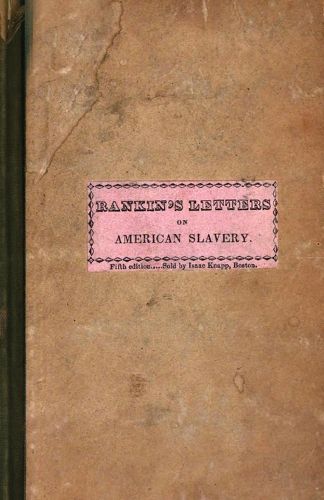Readings Newsletter
Become a Readings Member to make your shopping experience even easier.
Sign in or sign up for free!
You’re not far away from qualifying for FREE standard shipping within Australia
You’ve qualified for FREE standard shipping within Australia
The cart is loading…






This title is printed to order. This book may have been self-published. If so, we cannot guarantee the quality of the content. In the main most books will have gone through the editing process however some may not. We therefore suggest that you be aware of this before ordering this book. If in doubt check either the author or publisher’s details as we are unable to accept any returns unless they are faulty. Please contact us if you have any questions.
When Rev. John Rankin first penned his Letters on American Slavery in the 1820s and 1830s, he did so not with the distance of a scholar or the detachment of a politician, but with the burning conviction of a man of faith-a minister and father unwilling to remain silent as human beings were bought, sold, and brutalized under the sanction of American law and culture.
Writing to his brother in the slaveholding South, Rankin laid out an uncompromising moral argument against slavery grounded in the teachings of Scripture, the claims of conscience, and the founding ideals of the American republic.
Rankin's voice was a prophetic one-not only because he called his nation to account, but because he did so before it was fashionable or safe to do so. His house in Ripley, Ohio, became a station on the Underground Railroad, and his moral clarity helped inspire others, including William Lloyd Garrison and Frederick Douglass.
Nearly two centuries later, Letters on American Slavery still speaks-both as a historical document and a moral compass. Rankin's urgent appeal to his brother-to see the humanity of the enslaved and to act in faith-is a timeless reminder that silence in the face of oppression is complicity.
We invite you not only to learn from Rev. Rankin's words but to be challenged by them. His arguments were rooted not in partisanship or politics, but in the belief that justice, if it is to mean anything, must be lived out-publicly, sacrificially, and without fear.
These letters are not relics of a bygone era. They are calls to action for ours.
July 2025
$9.00 standard shipping within Australia
FREE standard shipping within Australia for orders over $100.00
Express & International shipping calculated at checkout
Stock availability can be subject to change without notice. We recommend calling the shop or contacting our online team to check availability of low stock items. Please see our Shopping Online page for more details.
This title is printed to order. This book may have been self-published. If so, we cannot guarantee the quality of the content. In the main most books will have gone through the editing process however some may not. We therefore suggest that you be aware of this before ordering this book. If in doubt check either the author or publisher’s details as we are unable to accept any returns unless they are faulty. Please contact us if you have any questions.
When Rev. John Rankin first penned his Letters on American Slavery in the 1820s and 1830s, he did so not with the distance of a scholar or the detachment of a politician, but with the burning conviction of a man of faith-a minister and father unwilling to remain silent as human beings were bought, sold, and brutalized under the sanction of American law and culture.
Writing to his brother in the slaveholding South, Rankin laid out an uncompromising moral argument against slavery grounded in the teachings of Scripture, the claims of conscience, and the founding ideals of the American republic.
Rankin's voice was a prophetic one-not only because he called his nation to account, but because he did so before it was fashionable or safe to do so. His house in Ripley, Ohio, became a station on the Underground Railroad, and his moral clarity helped inspire others, including William Lloyd Garrison and Frederick Douglass.
Nearly two centuries later, Letters on American Slavery still speaks-both as a historical document and a moral compass. Rankin's urgent appeal to his brother-to see the humanity of the enslaved and to act in faith-is a timeless reminder that silence in the face of oppression is complicity.
We invite you not only to learn from Rev. Rankin's words but to be challenged by them. His arguments were rooted not in partisanship or politics, but in the belief that justice, if it is to mean anything, must be lived out-publicly, sacrificially, and without fear.
These letters are not relics of a bygone era. They are calls to action for ours.
July 2025